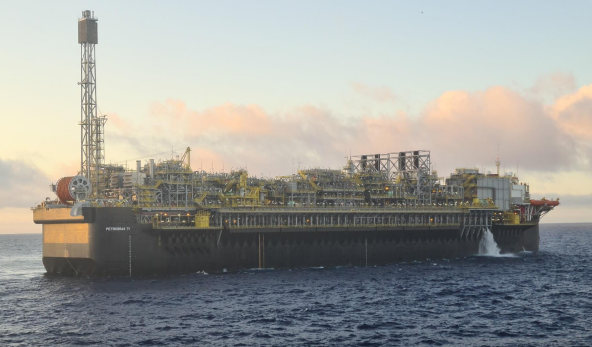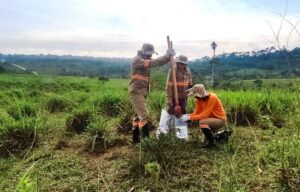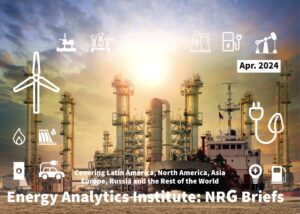
(Petrobras, 29.Apr.2024) — In 1Q24, average production of oil, NGL and natural gas reached 2,776 MMboed, increase of 3.7% when comparing with the same period last year (1Q23). Among the main factors behind this variation, we can highlight the ramp-up of the FPSOs Almirante Barroso, P-71, Anna Nery, Anita Garibaldi and Sepetiba, as well as the start-up of 19 new wells from complementary projects in the Campos (11) and Santos (8) basins.
It is worth mentioning that, in comparison with 4Q23, production was 5.4% lower mainly due to the higher volume of losses due to stoppages and maintenance, as projected in the Strategic Plan 2024-28 (SP 2024-28), and the natural decline of mature fields. These effects were partially offset by the greater contribution of the FPSOs Almirante Barroso (Búzios field) and P-71 (Itapu field), after reaching peak production during 4Q23, and by the ramp-up of the FPSOs Sepetiba (Mero field) and Anita Garibaldi (Marlim, Voador and Espadim fields).
On 7 Mar., we started delivering gas through P-68, located in the Berbigão and Sururu fields, helping to increase the reliability of gas deliveries through the integrated Santos Basin network.
On 24 Feb., FPSO Marechal Duque de Caxias left the shipyard in Yantai, China, heading for the Mero field, located in the pre-salt of Santos Basin. The platform, which will be the field’s third definitive production system, is scheduled to start operating in the second half of this year and has the capacity to produce up to 180 Mbpd of oil and 12 MMm³/d of natural gas.
On Mar. 2024, Búzios field reached the production milestone of 1 billion barrels of oil. The field currently operates with five platforms: P-74, P-75, P-76, P-77 and Almirante Barroso. In the 2024-28 SP, we project the deployment of six more units in the field by 2027.
In the Refining, Transportation and Marketing segment, total production of oil products in 1Q24 was 1,753 mbpd, 6.1% higher than in 1Q23. The share of diesel, gasoline and jet fuel in total production was 67% in 1Q24, in line with the same period last year.
The total utilization factor (FUT) of the refining facilities remains high, reaching 92% in 1Q24, 7 p.p. higher than in 1Q23 and 2 p.p. lower than in 4Q23, even with significant scheduled stoppages at REPAR and REPLAN.
In 1Q24, pre-salt oils represented 67% of the feedstock in Refining, 2 p.p. above 4Q23, contributing to a more sustainable refining activity and high yields of diesel, gasoline and jet fuel.
Regarding Energy Efficiency and Operational Excellence in Refining, the RefTOP Program, based on the 2024-28 SP, covers all the refining facilities. The Program’s optimization projects and initiatives helped us achieve 36.3 kgCO2e/CWT in Greenhouse Gas Emission Intensity in 1Q24, 1.4 kgCO2e/CWT less than in 1Q23, and 104.8 in Energy Intensity, 1.7 points lower than in 1Q23, in line with our focus on achieving the commitments made for 2030. These results indicate a reduction in greenhouse gas emissions in the quarter equivalent to more than 2,200 urban buses running 5 days a week, 300 km/day.
As of March, we have expanded our offerings of more sustainable products on the domestic market by starting to sell diesel with renewable content (R5) in São Paulo at RPBC, which, like REPAR, is already able to regularly sell fuel capable of reducing greenhouse gas emissions. In addition, we established a partnership with the second largest asphalt distributor in the country to sell CAP Pro W, a product launched at the end of last year, stimulating the development of the more sustainable asphalt market.
In line with the strategy of expanding access to markets in the interior of the country, we started selling diesel and gasoline in Rio Verde (GO), the second new sales hub in the Midwest, a region whose demand for fuels has increased mainly due to agribusiness. The first new hub was Rondonópolis (MT), inaugurated at the beginning of last year.
We carried out the scheduled stoppage of the Mexilhão Platform (Route 1) for preventive maintenance, aiming to continuing production, flow and natural gas supply operations safely. During this period of restricted domestic gas supply, the company operated through its portfolio of offerings made up of domestic and imported origins (Bolivian gas and LNG) to fulfill its signed commitments. It should be noted that this intervention was carried out in parallel with the scheduled maintenance of the Caraguatatuba Gas Treatment Unit (UTGCA), in order to minimize the effects of gas delivery restrictions.
We resumed ownership of the Bahia LNG Regasification Terminal (TRBA) on 01/01/2024, without operational discontinuity, after the end of the lease period for third parties, at the same time as we put the Excelerate Sequoia LNG regasification vessel (FSRU) into operation at TRBA.
We acquired international I-REC certification (Renewable Energy Certificate) that neutralizes Petrobras’ scope 2 emissions by 2023, ensuring that all the electricity purchased by Petrobras to carry out its activities has been generated by renewable sources.
____________________

